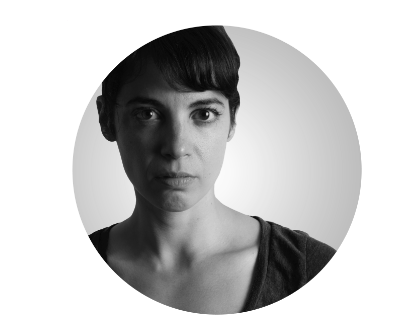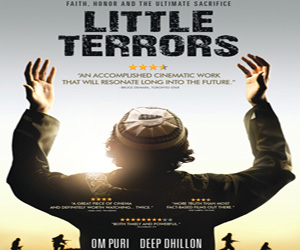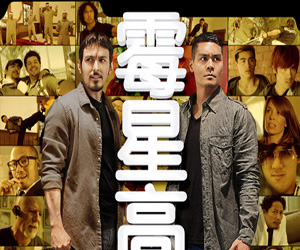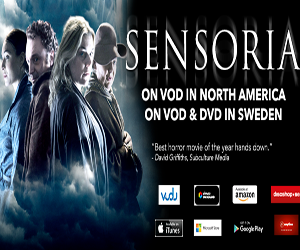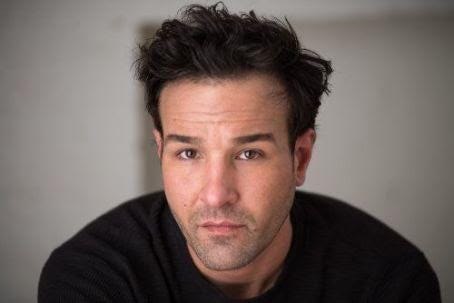
GEORGE KATT ACTOR – ‘Alienated Movie’
Film Courage: Where did you grow up?
George Katt: I grew up in New York City. I was born in Queens. For the longest time I was under the impression that I was born in Astoria, Queens until recently. I actually looked over my birth certificate and it reads Long Island City, Queens. It was in a hospital on the cusp there between Astoria and same difference really the border for the areas can easily blend. But basically, I grew up in New York city / on the boroughs, went to NYC public schools and for up until high school I was on the borough of Staten Island until graduating. Then I moved to Manhattan.
Life at home was good. I’m forever grateful for the familial life I had growing up. Not without its difficulties, of course, but I was fortunate to grow up with loving parents and two wonderful siblings. Public schools are rough in New York so my brother and I also grew up pretty street smart as well.
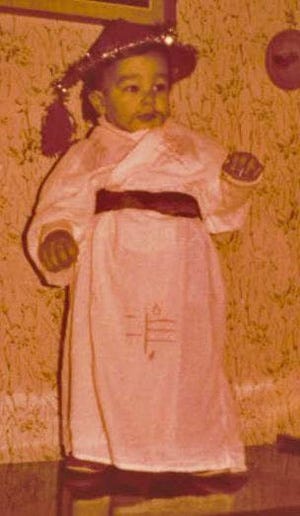
George at age 2 or 3 years old
Film Courage: Did your parents encourage acting or attempt to point you in another direction?
George: No. Not at all. I can’t say they encouraged acting. In fact, they were highly against it initially when I made the great leap to pursue it and advised me to go in another direction. I say great leap because I believe it wasn’t expected. I myself in many ways didn’t expect it. I was a very good academic student with great grades, A’s, honors, advanced placement courses, extremely shy and quiet, all that jazz and It was concerning to them when I threw out the curveball that I decided I was going to school for theater.
Today, of course, I clearly know why they advised another direction. They were very unfamiliar with the territory and also were being protective. They cared. They wanted me to have a more stable career path. I understand that now.
I also have to fairly mention that they eventually did encourage and believe in me and the craft I chose. Through the strides and struggles and frustrations of what I had gotten myself into, as they did. They paid for some of my acting classes, came to my shows, et. cetera. Through the long process they still advised me to change career paths very often and were uneasy about it, but at the same time they were continuously understanding and supportive. And that was hard for them because they did not want me to struggle as they did. It took a lot of understanding and acceptance on their part and I love them for that.
Film Courage: Did you go to school for theater, dramatic arts or film?
George: Yes, definitely and many. In New York’s Marymount Manhattan College for theater, The Lee Strasberg Theatre & Film Institute, many classes over at HB Studios, did a special drama training program over at the The Juilliard School as part of the National Actors Theatre with Tony Randall, The Actors Studio wonderful mentors, teachers and private coaches. In Los Angeles with Eric Morris, daughter Suzzane, Ivana Chubbuck and also at the Playwrights Kitchen Ensemble headed by Dan Lauria. I always loved studying the craft and always, to this day, love to constantly grow in my work. A plethora of options and styles to pick and choose from. Be it for theatre or film. Whatever would work for me I would store away in what I like to call my ‘file cabinet.’ Many wonderful schools and teachers available out there.
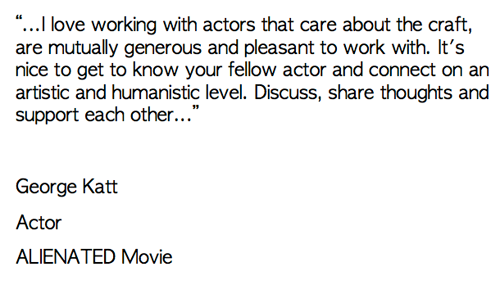
Film Courage: You had originally wanted to become a musician? Why did this change?
George: I did. I think that was an earlier ambition of mine because I picked up the guitar at an early age. I think when we are younger all of us have this inner rock star / musician thing happening. Music can be highly affecting and important when you are growing up through adolescence. Then, if you add the layer of knowing how to play an instrument or sing well it will just amplify the love for it. I love music and I still play my guitar, but I also loved film and wanted to be a filmmaker which is what triggered me into taking my first acting class in high school. It was recommended for me to do by my film class teacher I was studying with at the time. Then, that was it. It changed when I began to discover other things about myself through the craft of acting. And it was a very different kind of discovery about who I was or wanted to be with a whole new emotional stratum to play in. Acting clinched the more passionate side for myself personally and the more passionate side for my interest in life itself.
Now aside from the artistic involvement, on a business level, we all know they can be very similar. Cut-throat, competitive, monetarily exploitative and so on. Very paralleled.
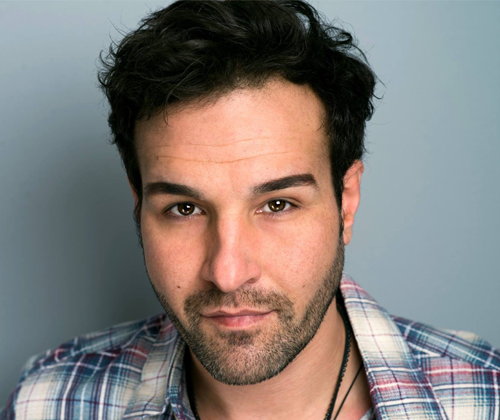
Photo by Scott Kowalchyk
Film Courage: Do you embrace risk or feel more secure with a well-known (creative) path?
George: Oh boy, yes. You have to embrace risk. Without risk there is nothing creative. You have to embrace risk not only with security in financial planning or career paths but also more importantly risk in in the work itself. In the craft itself. No guts, no glory. No discovery. You have to embrace risk, patience the choices in the work, mistakes, frustrations, growth it is constant and never-ending. Most importantly, and not as easily said than done, is embracing a lot of acceptance.
Film Courage: How much does intuition guide your life?
George: Very much so. I can safely say I am very intuitive. I believe we all are – it’s just that some are more connected to that energy than others. Some ignore it through negative conditioning. I’ve had many experiences where I later on realized I did not listen to my healthier instincts but they were there all along. And if I had – I may have had a better experience? The light that’s inside they say. Follow the light already there. We’re all born with it. I chose to ignore it of course plenty of times and a lot can happen. Bad choices. Unsuccessful relationships – connections with people that are not ideally healthy and so forth. I think healthy intuition also has to come from healthy awareness and personal spiritual growth. I think when I am more in tune with that, as I try to be today, I can feel better or safer about my guttural intuition and instincts.
Instincts and intuition are also extremely important in acting. That goes without saying. But I say it.
Film Courage: How important is authenticity to you?
George: Authenticity I equate to honesty. Extremely important in my life, in my connections and in my work. Wolfgang von Goethe beautifully said ” What is uttered from the heart alone, will win the hearts of others to your own.” I make my best efforts to work the honesty and authenticity muscles. Dishonesty will come back to bite you on the ass, that’s for sure. Be it, in life or in the work.
Film Courage: Best and worst thing a casting director ever said to you?
George: Best things I’ve heard in casting offices are things like “wonderful” or “you’re an amazing actor and I am going to find a place for you on this show” or “we’d like to offer you the role” or the phone calls for straight offers from casting are always great. I mean, those are the the best scenarios and experiences I’ve had when a cd becomes familiar with my work. You make a great impression, you have a recurring relationship with them when they are casting projects – are on their radar consistently – and most importantly you’ve respectively merited casting directors as fans of your work. That is the best that has happened / is happening to me with casting directors.
Worst: I haven’t heard anything tremendously horrible like some of those horror stories I’ve read about. Granted, you can deal with a lot of coldness or indifference at times that can be confusing – but I’ve learned not to read into it anymore. In LA, I once had to do a monologue for this a**hole that decided to gorge on a large piece of birthday cake (somebody in his office was celebrating) the entire time without even looking up once… and throughout it he was loudly chomping away. I walked out and was confused and thinking “that was f’n weird and what a piece of sh*t he is.” But my experience for the most part has been positive and the majority of professional and legitimate casting directors (especially in NYC) are wonderful souls that care about the actor and care about the work that they do and the work that we do.
The only other 2 incidents I can think of that stand out for me, other than that one… there was one that really bothered me. It was for a tv series pilot that was set during the Vietnam war and the audition scene placed the character right smack dab in the middle of a gunfight and explosions and an attack and people dying and all hell is breaking loose! Chaos. You get the idea right? So, it’s very clearly written in the script as to how he is reacting to all of this and to his men and you know… you go into things in order to justify what the writer has done and created on the page here… and it was a really intense scene for an audition – so you commit!! Right? So, yeah I commit dammit! I kick this read off and am instantly stopped within the first two lines to by this casting director… hmmm (confused beat of silence)…. and then she goes on to say: “Look, I have a bit of a headache today and it’s a small room. Can we actually not do what it says and just keep it quiet?”. And what do you do? I have to stay open here right? Do I appease this casting director now and not burn a bridge here – but then, wait – the producers are going to see this f’n tape and not find any justification to what is happening here… and on the fly I gave in and ended up adjusting it to a different circumstance and reality for myself. I ended up intensely whispering the scene and changed the scenario to where I didn’t want the enemy to hear me. But again, that is not what was written in it. And I walked out regretting that I did not stick to my guns about how I would have played out the scene. Thinking okay – the producers and the director are going to watch this now and not really know that the casting director had a headache and told me to be quiet – thus the reason why this guy is like f’n whispering in this scene when he is supposed to be screaming at his men. I walked out and wondered if she had a headache during the time the other actors read and did they end up doing justice to the scene in the way it called for. I can understand playing opposite choices at times that can be brilliant and all of that wonderful jazz when it can really work. But this was different and not going to work with that scene. It was a great role for me and of course I was not cast. I promise to never do that to myself again. It is horrific when a casting director decides gets involved in the artist’s performance in a detrimental or deconstructive way due to their own personal issues.
The last one was more of a learning curve. I was like 18 years old in NYC and just started making the rounds and cold cattle calls with my black and white headshots. It was probably one of the first and early audition experiences I had professionally. I had gone into an audition for what was at the time a very popular Shakespearean touring theatre company. I walked in and I immediately approached the casting director to shake their hand and she instantly scoffed at me and reprimanded me. She said ” Now, let this be a lesson to you young man: NEVER, EVER approach anyone to shake their hands in a room unless they offer their own hand first.” Of course, it threw me off. Made me nervous for the rest of the audition and I felt like had already messed the whole thing up. It was disheartening because I’ve always been warm and friendly. But you know what? It was sincerely a great lesson I learned. So, I thank that woman. It triggered me into keeping to myself and to just think about my work in that room and not them. To this day, that is the first thing I am instantly aware of when I walk into a casting office. Focus on the work. I have never approached a table again since – unless my eye catches those casting directors, producers or directors that may stand up and politely introduce themselves and offer their hand first. Then, I will politely reciprocate.
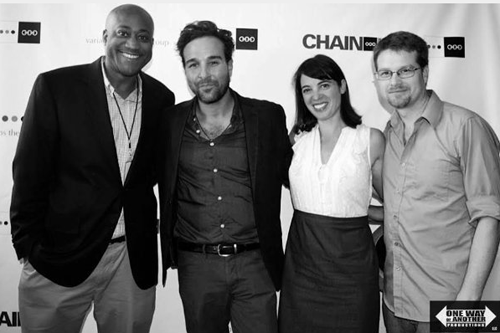
Producer Princeton Holt, George Katt, Jen Burry, Writer/Director Brian Ackley
Film Courage: You have a quote on your IMDB page which reads ‘The quiet after filming is like nails on a chalkboard for me.’ Why is this? Have you ever been guilty of being too busy?
George: Wow. Yes, that was from a few years ago. I’ve definitely been guilty of being too busy even when I am not “busy,” per se. There’s this hunger thing that happens. It can be like hunting for sustenance at times. Needing that next fix of work. Feed the soul kinda thing. That’s not very healthy though. Not for your personal life. I, at times, found myself almost going mad running around and not knowing what to do with myself when I wouldn’t be working on a character or a project. But, I’ve gotten a lot better with just sitting with myself over the last couple of years. And also, since my father passed away recently it really affected me. I’ve been really working on living more in the moment. Trying to be content and grateful and at peace with myself, regardless if I am working or not. To just “be” at times… and to just do absolutely nothing. It really is a muscle that I’ve been working on. There is definitely an odd uncomfortable silence or void for me when I finish a project. I think many actors that love and commit to the work can relate to that. You invest in this person / this character and start to care for them and care for the other actors and the crew and then there’s this familial creative thing that happens on some projects and then… boom… okay here’s the martini shot… bam… clapping, pats on the back… and… finito… It’s done. You go home and sit on your bed and sigh. It’s bitter sweet. You think okay… tomorrow I’m not shooting or getting on that stage again. It’s weird. Sad. Like all this build up and work and then it’s a drop of a hat. That’s the ‘nails on a chalkboard’ thing for me. There’s a certain peace that comes for me when I am working on a role. It’s tricky because I don’t want to use it as escapism. Acting can be a very spiritual experience for me as well. That’s maybe why it grabbed me. But today, I try to stay spiritually connected at all times. I’ve been learning to really love myself lately and working on being peaceful with just sitting with me and being good ol’ George. But that feeling when you finish up work on something is like… okay, I gotta let go of my baby now.
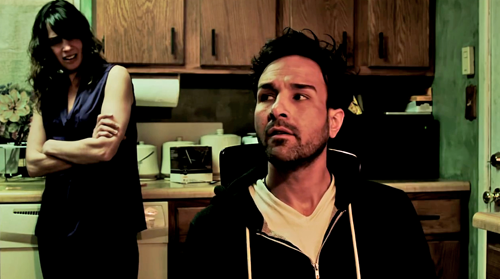
Film Courage: What event in your life would you like to live over and why?
George: This question makes me sad. Because when I think about it, there are many. But today I work on living in today and in the moment and not in the past or too far into the future. Marlon Brando once said that guilt is a useless emotion. The same goes for thinking about going back to live over certain events. Wishing we had made different decisions. Who doesn’t? If I think about that stuff… and I do… I am just beating the sh*t out of myself. It’s useless. It’s pointless. We don’t have the power to do that. I read in this book something that affected me and that probably made more sense to me than anything else on this subject… it still really stuck to me – it says: that in order to become who and what we truly are; we have to first experience who and what we are not. I repeat this constantly since then. It makes sense, right? Without experiencing this opposite we would not know the latter. I believe the point is to be aware. To grow from the looking back and not be too concerned with changing it. Onwards and upwards, as they say.
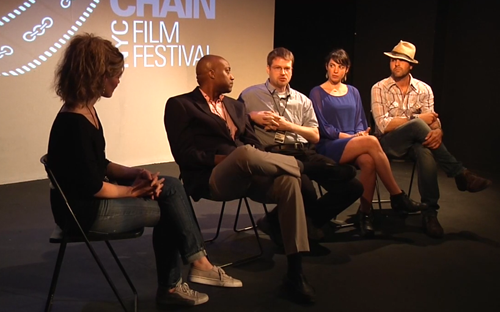
Chain NYC Film Festival’s Christina Perry sits down with the team from ‘Alienated’ Writer/Director Brian Ackley, Producer Princeton Holt, and Actors Jen Burry and George Katt
Film Courage: How did you first meet Writer/Director Brian Ackley and Producer Princeton Holt from the film ALIENATED?
George: I was first introduced to Princeton through a mutual wonderful actress friend and colleague, Meissa Hampton, that connected us and who had previously worked with him on one of his films for One Way or Another Productions. I had invited him to be a special guest speaker at The Indies Lab (a workshop group I founded and would moderate – a multicultural ensemble made up of seasoned actors, writers, directors and filmmakers that would get together once a week and develop new works here in NYC). I loved Princeton and what he shared right off the bat. We stayed in touch. A couple of years later he contacted me about doing Alienated.
Brian I met through Princeton. Our initial intro was via phone, as Brian lives outside of New York. So, when I was cast in the film we spoke over the phone about the script, the character, et cetera. I picked his brain about what inspired him… he picked mine… we shared our thoughts and we hit it off. I didn’t actually meet or rehearse with him at all until the first day of filming.
Film Courage: How did Brian or Princeton pitch you the script?
George: I just remember Princeton calling me out of the blue. He was always so kind and complimentary to me about my work and what I had created with The Indies Lab; and I remember throughout our relationship how he would talk about wanting to work together on something. So, one day he called me and said he was making a movie in just a couple of weeks that he was producing. He told me a bit about the script and what he wanted to accomplish with the project in this short amount of time. He also mentioned how simplified and minimal the production would be and how solely dependent on the actors’ performances it was… and also importantly… that the dialogue in the film was a beast to tackle, immense and tremendous… and he believed that Jen and I were the only actors he knew that could pull it off in this limited amount of time before production.
I was already gravitated to working with Princeton, regardless, because of his taste and passion for poignant independent cinema and to the type of man he was. So, I was immediately interested in reading the script and up for the challenge with this monster dialogue Brian had written. It read like an intense 2 hour – 2 character play.
Film Courage: What made you say “yes” to this project? What attracted to the role?
George: Reading the script. Loving the character. Finding things I connected to. It was like… wow… a blessing of an actors piece. Something to really sink my damned teeth and heart into. A plethora of emotions, a connectivity and a truthfulness that I loved about it. An actor’s dream to come by in a script.
In all honesty, It reminded me of great theater. Great plays like Tennessee Williams’ work. Watching a relationship unravel, unfold and ravage right before your eyes on film. It was a unique story about love for me. Like Streetcar was for its time… it was a relationship… it was love… Stanley and Stella… but I felt Nate handles things in the form of a very different kind of beast.
Film Courage: At what point did you meet Jen Burry (your wife Paige in ALIENATED)? / How was it rehearsing without Writer/Director Brian Ackley always being present?
George: We first spoke via telephone once we were cast. We both talked about being very nervous about memorizing all of this dialogue and doing all of this prep work in the insane short amount of time we had; and this was without having any rehearsal time available to us at all with the director before shooting. I think we were both like, are we f’n crazy for doing this? How are we going to pull this off? In theatre you can have months of rehearsal time before opening night. This was actor kamikaze here. So we both said we have to meet as much as possible. We first met at a coffee shop in NYC and just began to read it together. We basically rehearsed in NYC coffee shops. Never on our feet. We first did a simple read through and then I suggested we begin to break it up into acts and work on each act chronologically, one step at a time, every time we met. We would get through the acts individually, take notes, discuss and try and memorize together as much of the page as we could. I believe we had to rush through the last act of the script because we basically just didn’t have enough time.
The thing was, I think in many ways Princeton is brilliant for this. His casting of this film. I don’t know how, but he somehow knew that Jen and I would be able to do this thing together. I had never met or worked with Jen before but we hit it off and really respected each other as actors. We would be there as a safety net if either one of us fell or faltered. That’s how it should be. She was a pleasure to work with and an actors’ actor so it made it easy once we were rolling. We connected with ease on it all.
Then when we began filming, before most of our scenes, I would just take a deep breathe, turn to Jen and say: “Okay kid, you ready? Let’s just live through these moments.”
Read Jen Burry’s post about acting and ALIENATED
Film Courage: How much direction did you receive from the director when he arrived on set (since he lived in another state)? Was a lot of the directing in the script?
George: Brian is a director that trusts. I love that about him. He is simple and he brought this sweet and calm energy to the set. He allowed us to go with our instincts. He didn’t try and control things or to “direct” much per se and that was wonderful about him… because like several great directors are quoted in saying: 90 percent of directing is in casting, or something to that effect. Brian worked in that way and trusted us. We would discuss, philosophize, laugh, cry, whatever… and then do a quick run-through for the setting up of the shot. Then it was off… like a rodeo… action… and Jen and I would just come out of the gates Brian had already set up.
Film Courage: What motivates your character Nate in ALIENATED?
George: Love and fear motivate him. Very basic human needs that motivate us all. Wanting to be loved and understood. His passions and his interests motivate him. Fear of not getting what he wants and losing what he already has. A feeling of being an outsider and also wanting to belong. The layers to him are just other complications and colors, but the motivational groundwork for him is very basic and humanistic.
Film Courage: How did you approach the role of Nate?
George: I always approach my characters through compassion. Whether it be a bad guy or whomever. I feel an actor has to relate and understand the driving motivations and factors in a role. What is his or her truth here? I also try and bring what I can from my own life experience into this understanding and connection. It was easy to connect with Nate. I found a lot of aspects of myself I could parallel to him. We all have a Nate in us. I just had to trust and allow myself to come to into him.
I do have to mention something that is extremely important here… there was also was another driving force in my performance for this film. In many ways Alienated is a very special film for me. You see, when I began filming I had just recently found out that my father was ill with cancer. He was in the early stages of being sick when I had to head out to shoot the film. I was very sad, worried sick and under emotional duress during filming. It is not what I expected to happen during production because it was all so sudden and quick, the way his illness happened – So, I just had to use what was going on with me personally and correlate this into Nate. I had no choice really, and I always remember what the great Roy London said: Use whatever is going on or is happening with you within that day – inject it into your work, into the moment… allow it in there. Use it. So Nate was a combination of things. Initial prep work, thoughts, relating and then just allowing myself to live through him in this story and these circumstances.
Nate is a special character for me and Alienated is a special project for me because it is also the last feature film I performed in before I lost my father.
Gravitas will be releasing ALIENATED
theaters in March! Check back here for more info
Film Courage: Do you like to know lots about the story and the other characters parts of a film, or just your part to keep the character true?
George: Initially, I love to know it all. I’m really a curious George. There sometimes can be information or clues for you that isn’t immediately available in just knowing your own part. Following this, I end up putting the blinders on and primarily just focus on the character I am playing. Although, there have been instances where I have to focus on only on the parts of my character… especially for television scripts.
Film Courage: Where did you shoot the film?
George: We filmed in a house in New Jersey. It was Spring. We all stayed in the same exact house that the film was shot in and I dug it because it really helped me get acquainted and familiar with Nate’s home and environment. The usage of his space.
Film Courage: Where did you shoot the film?
George: We filmed in a house in New Jersey. It was Spring. We all stayed in the same exact house that the film was shot in and I dug it because it really helped me get acquainted and familiar with Nate’s home and environment. The usage of his space.
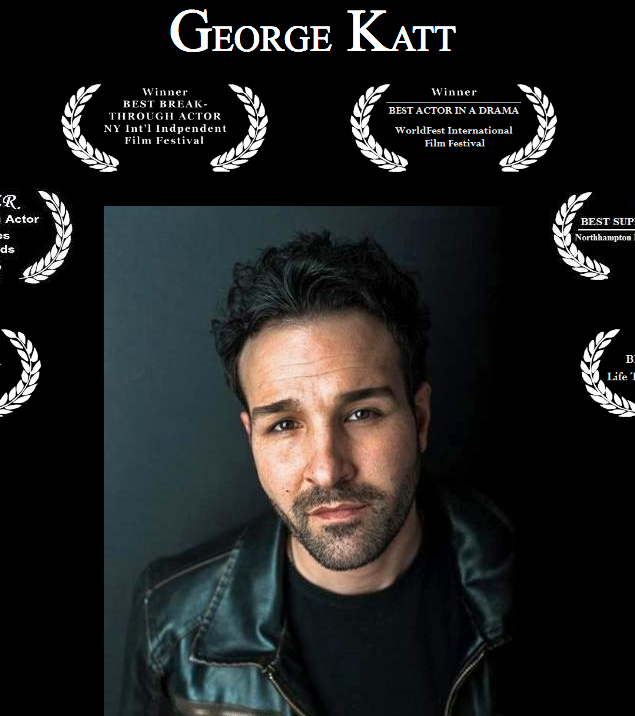
Film Courage: Can you share how the 6-day shoot broke down script wise? What was the 6 days on set like otherwise?
George: I think we were shooting about 15 pages a day? A lot. They were long and intense days but the intimacy of the location / the house and the minimal size of the crew was very helpful and efficient. It was like the house was our stage and the play would be performed with the cameras following these characters in action. We also filmed most of it pretty much in chronological order to the way the script played out and that was extremely helpful, as we developed in natural chronological creative harmony along with the chronological telling of the story. Very much like a stage play. It was a 6 day live-wire.
Film Courage: What scene in ALIENATED was the most difficult?
George: I think it was the driving scene at night with Taylor. It was one of the very few times we were outside the elements of the house and it was more technical than anything else. Stopping at the lights, getting sound and lighting right and kicking in performance while driving and being aware of the rest of the ongoings and for the safety of the crew in the back seat. In addition, you’re manipulating a specific speed of the vehicle at the same time. I’ve driven quite a bit for films, so it was nothing new to me, but that was the only scene I can honestly think of that I found to be a bit challenging. And it wasn’t even that bad.
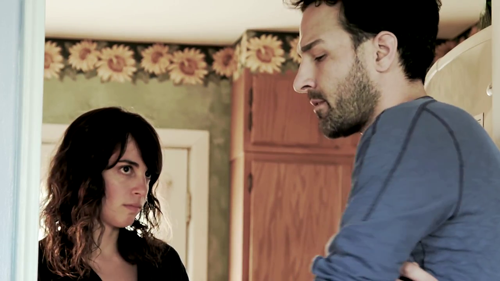
Film Courage: When you’re playing opposite an actor which you have a close relationship with in the film, how do you work off screen to build a rapport?
George: This really varies on the type of personality or actor you’re working with. Also on the duration of the shoot or time you have together on a project. I love working with actors that care about the craft, are mutually generous and pleasant to work with. It’s nice to get to know your fellow actor and connect on an artistic and humanistic level. Discuss, share thoughts and support each other. I do not enjoy working with megalomaniacs or self-serving egos. It brings a different energy to the set that isn’t appreciated or creatively safe for the rest of the cast, the director or the crew. Fortunately, that didn’t happen on this set and I believe that is a partial factor that helps make it a great film… that helps make a lot of films great in my opinion. Positive energy equates to success. Jen Burry and Taylor Negron are great souls. They cared about the craft and cared about others and in that short amount of time I had the opportunity to get to know them also on a personal level. I loved working with them and maintained a friendship with them that lasted following the shoot.
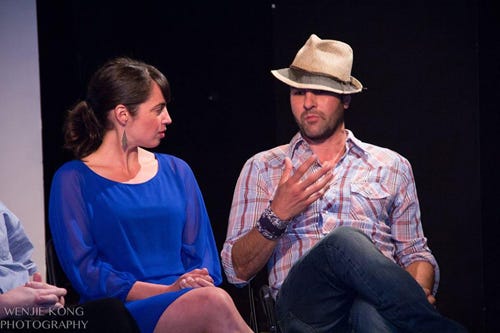
Jen and George at Chain NYC Film Festival Q&A
Film Courage: How would you recover from the emotional scenes of the filming at the end of the day? How do you switch off?
George: It can be difficult. Maybe how some recover from a really tough day at work or a challenging experience? Except when you’re an actor you can really go through this emotional roller-coaster ride and it can be exhausting. Had a lot of that in this film. This one was also very different for me because at the end of the day… at the end of the emotional scenes… I was still emotional. I was personally worried about my father. So, I would try and meditate and pray. Prep for the next day… cry at times to release. You know. Or just make myself an iced coffee and step outside for a cigarette, look up at the sky and just allow and accept what I was feeling.
Film Courage: Where is ALIENATED currently available to watch?
George: Gravitas will be releasing it on VOD, Cable VOD and in select theaters in March.
Film Courage: How was it working with Taylor Negron?
George: It was an experience and a person I will never forget. I first met Taylor and was introduced to him by Princeton at Taylor’s apartment in Manhattan. We all sat down with Brian for an initial intro and a read-through. I instantly felt an energy from Taylor that was otherworldly-connected. Extremely spiritual and good. I can’t really explain it in words but I felt it throughout working with him and knowing him. I remember thinking to myself, wow… this was a special person here and in touch with some things that most are not in touch with… a good soul that has been through a lot in his life. I could tell all of this instantly about him. He had a wonderful smile and would speak about things that I understood very well but that maybe others would scratch their heads at. We philosophized quite a bit and also sometimes sat in silence in the same room between takes with this interesting energy and mutual understanding. He LOVED the work. I know he adored it. I also know how enthusiastic he was about his role and about this film. I know that while he was there, he was extremely grateful to be there and he expressed it. Sometimes you come across these special lights. That’s what he was like.
The other thing is, I had shared with him about my father’s illness and he was just so amazingly kind and gentle and supportive about it. And this continued after filming. He knew I was struggling with my father’s sickness and loss and he would write to me on Facebook and send me deep and hopeful messages of encouragement. All along, he never once mentioned that he was ill with cancer himself during this time. That was unreal to me. About a week prior to his passing he sent me a message on Facebook (this was following my father’s own passing). I am grateful I had the opportunity to get to know him and to also let him know how amazing I thought he was and how highly I thought of him. When he passed away and I found out it was from cancer it really hit me hard in the gut. I had just lost my father and then this friend that I had no idea was dying this entire time was gone – out of the blue. It really affected me. I’m grateful to have met him, to have worked with him and to have known him in the time that I did. I believe we connected on this film for a reason. No accidents with this universe.
It was difficult. I lost 3 people I really loved and cared about within a year’s time span. 2 of them to horrific cancer.
After he wrapped on the film, Taylor left a comment for me on a photo of us on Facebook that I still have – it reads: “George Katt, Last night shooting in the 7/11 parking lot was very exciting for me. I have never acted blind in a convenience store in New Jersey. You are a deep soul.”
Gravitas will be releasing ALIENATED
theaters in March! Check back here for more info
Film Courage: What’s been the audience reaction to ALIENATED? Although it’s a serious film, in Q&A’s for a few screenings people found certain parts funny?
George: Yeah, it was so great that the audience laughed at certain things and reacted that way. I feel it’s because this on-screen relationship and the feuding between these characters is very truthful… sometimes uncomfortable… it’s familiar and very relatable with audiences… and that can hit a personal funny bone in them. This is always wonderful.
Film Courage: What principles have guided your life?
George: Spiritual growth. Love. Passion. Integrity. Courage. Faith. Constantly working on the higher self. Helping others.
Film Courage: Is there anything you haven’t shared yet, that you wish you knew before you made this movie?
George: No. Not on this one. I don’t wish I knew anything at all from what I already knew. It happened the way it did and it was special to me and I am grateful for that.
Film Courage: What’s next for you?
George: I just wrapped up a film. There’s also a film I’m in called “Turnabout” that just started making its festival rounds that I am very proud of. I don’t know what tomorrow holds. I pray for longevity in the line of work that I love and care so much for. That’s all I can do. I feel what I do as a gift that can also give back. I hope to continue to give back. The universe always has a way of bringing forth new and wonderful projects to me. I will just allow it.
Alienated – Trailer from Jake Lemmen on Vimeo.
BIO:
His most recent feature film credits include In the Gray opposite Lee Arenberg & Chad Lindberg, Conquering the Rose, In Montauk, Delta Zulu, Red Sheep, Bastards of Young, and Humdinger opposite David Moscow. He also recently wrapped starring film roles as Robbie Petras in the The Maladjusted; Mirland Cela in Percentage opposite Ving Rhames & Omar Gooding (directed by Alex Merkin/produced by Queen Latifah); Billy Cain in Turnabout opposite Waylon Payne & Peter Greene; Osgood Dupont in Mind Full of Blackbirds; and Raylan Miller in House of Bodies opposite Terrence Howard, Peter Fonda & Queen Latifah. He recently landed a recurring role as Marko on CBS’s series Unforgettable. For his performance in Alienated he and the cast won the Best Ensemble Cast award.
CONNECT WITH GEORGE KATT:
CONNECT WITH ALIENATED MOVIE:
Advertisements

.






